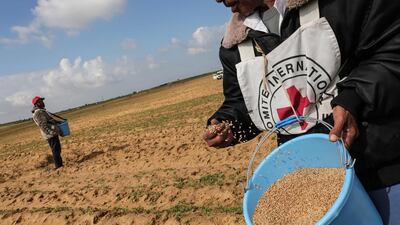The proposed budget for the International Committee of the Red Cross this year is 80 per cent higher than in 2010 because of increasingly protracted conflicts and growing humanitarian needs, its operations director said.
Dominik Stillhart said on Tuesday at a news conference that "protracted crisis is definitely the new normal, without any doubt".
One reason is that while virtually all conflicts today have local roots, they are "very often manipulated by regional powers, as well as global powers, who fundamentally disagree about what the solution should be", he said.
In the face of "these very deep-set disagreements between regional and global powers, we will unfortunately see many of these conflicts go on for quite some time", Mr Stillhart added.
The Red Cross has more than 16,000 staff deployed in about 80 countries, and this year's proposed budget for field operations is $1.8 billion (Dh6.6bn) — "80 per cent more than the budget we had in 2010", Mr Stillhart said.
He said the average length of Red Cross presence in its 10 largest operations this year — Syria, Iraq, South Sudan, Yemen, Nigeria, Somalia, Congo, Afghanistan, Ukraine and Myanmar — is 37 years. He said this is another demonstration of how intractable conflicts have become.
Mr Stillhart cited a number of reasons for growing humanitarian needs, the "first and foremost" being the "increasingly permissive environment for the use of force" in the past decade or so.
"On the one hand you have non-state armed groups that are gleefully violating the most basic rules of international humanitarian law, and on the other side you have states that take exception to the respect of international humanitarian law in their fight against terrorism," he said.
He lamented that foreign policy today "is very often seen through the exclusive prism of fighting terrorism", including labeling groups as "terrorists," which he said creates "a more permissive environment for the use of force".
Another reason he cited for growing humanitarian needs is the increasing number of conflicts in urban areas, including the Syrian cities of Aleppo and Raqqa, the former capital of ISIL extremists, and the Iraqi city of Mosul, once held by ISIL militants.
He said people in urban areas not only suffer the consequences of fighting but also the indirect consequences of conflict because of the destruction of vital infrastructure such as health facilities, schools and water and sanitation operations.
Mr Stillhart called Yemen "a case in point," saying its cholera outbreak that now affects more than 1 million people resulted from the destruction of more than half the country's hospitals and health facilities and the failure to pay health workers and garbage collectors.
"It is now the most serious humanitarian crisis that we are responding to," with 18 million people in need of assistance.
An Arab coalition backed by the US has been battling Iran-backed Houthi rebels since 2015. The Saudi-led coalition is fighting on behalf of the internationally recognised government of Yemeni president Abdrabu Mansur Hadi.
Mr Stillhard said the Red Cross is talking to countries directly or indirectly involved in Yemen about "the conduct of hostilities". He said Red Cross president Peter Maurer visited Saudi Arabia last week and there is now an improvement in dialogue, but he refused to give any details about the talks.
Mr Stillhart said the Red Cross is also in contact with Myanmar authorities, including the military, about the situation in Rakhine state, which has become the latest crisis it is responding to. More than 680,000 Rohingya Muslims have fled to Bangladesh from overwhelmingly Buddist Myanmar to escape a crackdown by the military that began following attacks by a Rohingya militant group on August 25.

